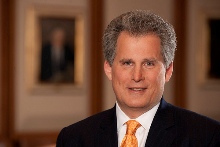
Typical street scene in Santa Ana, El Salvador. (Photo: iStock)
IMF Survey : As Global Crisis Recedes, Path Ahead Involves Difficult Transitions, Says Lipton
October 7, 2013
- Preview of 2013 World Bank-IMF Annual Meetings
- New transitions ahead for world economy, ones that will last years
- International community needs to manage these transitions together
Policymakers from around the world will gather in Washington, D.C., this week for the 2013 World Bank-IMF Annual Meetings, at a time when the acute part of the global crisis has now receded, says IMF First Deputy Managing Director David Lipton.

Lipton: Policymakers will come to the 2013 Annual Meetings wanting to know how the recent world events are going to affect them (IMF photo)
LIPTON INTERVIEW
The path ahead, however, involves a number of very difficult transitions for the global economy—transitions that are likely to last many years, he said in an interview.
IMF Survey: We’re on the eve of the IMF-World Bank Annual Meetings and we have central bank governors and finance ministers from all over the world converging on Washington. What’s on their mind?
Lipton: First and foremost, people will be coming here wanting to know how the recent events in the world are going to affect them. Obviously, with budget squabbles going on in the United States and the government shutdown, they will want to know whether that is going to have effects that are long-lasting in the U.S. and whether it will have effects around the world.
Also, in recent months, we have seen some capital flowing out of emerging markets, and that’s been a source of concern. Policymakers from those countries will be looking to the IMF to help them understand how this will play out, and what it means for their economies back home.
IMF Survey: What are the concerns of emerging market countries in this area?
Lipton: Major central banks have undertaken unconventional monetary policies that have been helpful in supporting the global economy, but the time will come for a change in those policies and for exit. The U.S. Federal Reserve has said that the time may be coming soon for the United States to begin tapering from quantitative easing.
Countries have seen market reactions to the Fed’s statements, and they want to understand what this is going to mean for them. We have been urging the Fed to communicate clearly, to ensure an orderly exit, and to have dialogue with other countries so the Fed can understand the impacts that their policies are having on the rest of the world—and so that the rest of the world can understand the path that the Fed is likely to follow.
IMF Survey: What is on the agenda for the Fund’s low-income member countries?
Lipton: Low-income countries have been growing rapidly for more than a decade and, so far, have not been greatly affected by the financial crisis or its aftermath. These are countries that rightly want to see their living standards converge to those of emerging market countries and someday to those of advanced economies. The risk is that problems in the rest of the world could, as has happened in the past, produce a setback for them.
We at the IMF are trying to help low-income countries understand potential spillovers, manage their own affairs, create policy buffers that will allow them not to be buffeted by the shocks reverberating around the global economy so that they can stay on the convergence path. And that will be a challenge, but it’s something that I think can be done.
IMF Survey: What are you looking for from the IMF’s membership? What would you like to see accomplished at these meetings?
Lipton: The setting of these meetings is that the acute part of crisis has now receded, and as the fog clears, what we are seeing is that the path ahead of us involves a number of very difficult transitions for the global economy, transitions that are likely to last many years. Typically, a recovery from recession happens in a year or two. But here, whether it is the United States exiting from unconventional monetary policies, something that could take years; whether it is Japan finally taking action to overcome stagnation and deflation, again, a process that could take years; or Europe dealing with the problems of financial fragmentation, creating new financial architecture, a banking union—these are all long-lasting transitions.
In addition, financial regulatory reform, which is changing the rules of banking to ensure greater stability, will produce long lasting adjustments in the business models of financial institutions.
In each one of these transitions, national authorities will have to play a key role in pursuing the right policies, but because each of those transitions affects all of us, there’s a need for the whole international community to manage these transitions together. And that means coming together and talking.
That is something that we at the IMF can facilitate. We bring people together, we provide our analysis of what these transitions will mean, and we provide our policy advice. I hope that in the Annual Meetings that we’re about to have, the policymakers coming from around the world will get a better appreciation of these transitions and will go home dedicated to working together to manage them as well as possible.
IMF Survey: What does this mean for the IMF’s work priorities?
Lipton: I think we will continue to play an important role in helping the world navigate these new transitions. But there are other parts of the world with their own important needs to be met. We, as an institution, are dedicated to supporting the Middle East and North African countries in transition. We are more involved than ever in those countries and have many IMF teams visiting them. Our work with low-income countries, our work with small states, I think, in each area we have a very substantial agenda to carry forward.


